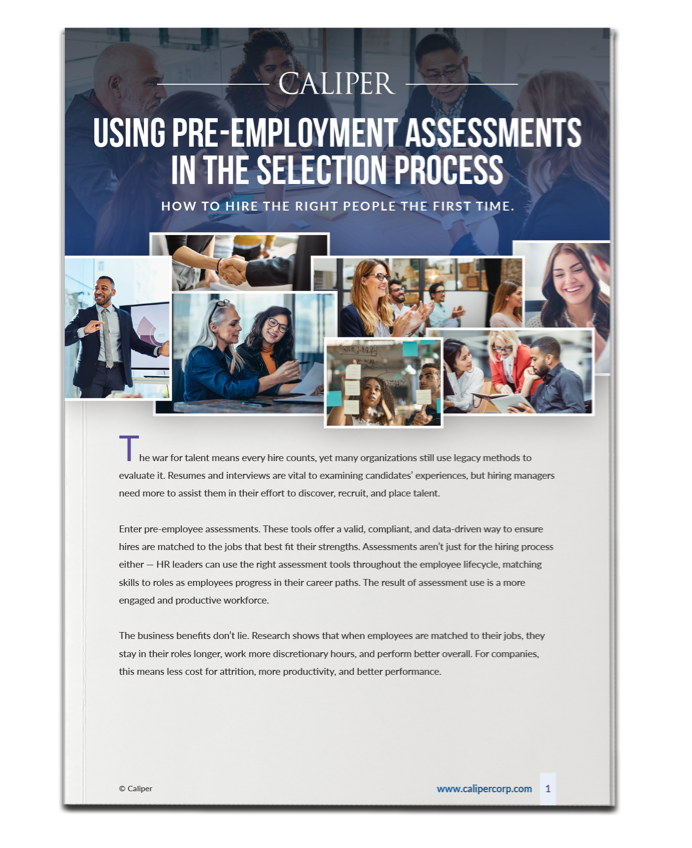Many organizations use a personality assessment during the hiring and selection process to gauge the future performance of their candidates. Assessments uncover aspects of the candidate’s personality that may be hard to identify during the interaction of a standard job interview. By using a personality assessment, the hiring manager can gain additional insights into a candidate’s potential match to a given job. They serve as a valuable tool to the decision-making process, and they can be integral in developing behavioral-based interview questions that uncover an individual’s motivations, potential, and overall suitability.
However, while using a personality assessment during the hiring process is widely accepted, using assessments for other aspects of employee development is a far less common practice. There are other areas of talent management—individual and team development, performance management, and succession planning—where the integration of personality assessments is highly beneficial and can provide organizations with more opportunities to develop the potential of their people.
Personality Assessment and Team Development
Although it may not seem obvious, team development sessions offer the opportunity for the effective use of personality assessments. Team development is the process of enabling a group of people to reach its common goal, and many issues arise when trying to move a team forward. Complicating the issue of teamwork is the fact that many teams today are virtual, with much of the team working off-site. Often, team members do not work in the same office and may not even be from the same country. This places even more emphasis on team communications and the personality style of each team member.
#PersonalityAssessments are just for interviews. Find out why @CaliperCorp says they’re a valuable tool for development and #TeamBuilding, too: Click To TweetAssessments can be used to better understand your team’s work styles so you have valuable information to tap into to increase productivity and get insight into team gaps. For example, after assessing your entire team, you may note those who have a facilitator work style. These individuals are more likely to keep the team on task and encourage stronger communication between members to create better working relationships.
Assessments are used to inform you about the overall strengths and weaknesses of the group and also to compare differences that could cause conflict. By targeting each individual’s specific work style and identifying how it may agree or clash with those of other team members, a greater understanding of the overall team emerges. Assessment results can also be discussed in a group setting with some analysis of the specific roles of each team member. Facilitators can often illustrate how different people bring different qualities to the team and how that can be used to everyone’s advantage.
Project Planning
In addition to team development programs, many managers use personality assessments when planning for projects and assigning specific tasks. They are able to do so according to the personality style of individual team members. This is referred to as a talent audit or team analysis process. It helps managers maximize the potential of their teams and individual members.
Measurable Business Results
By using team development, combined with assessments, companies can create high-performing teams that exceed everyone’s expectations. Organizations that employ these types of talent-management strategies see a relationship between team development sessions and powerful business results, e.g., new products created, revenue growth achieved, or project management milestones met.
#PersonalityAssessments are more than just a personality quiz. @CaliperCorp’s Caliper Profile is a scientifically-backed assessment to help find, develop, and harness your employees’ potential. Find out how it works: Click To TweetChoosing the Right Assessment
Assessments used in team development and team analysis are often different than those used for hiring or other talent management solutions. Many of these assessments are not validated for selection and hiring. There is a tremendous amount of information that can be utilized if the assessment used for hiring is the same assessment used for team development. First, many individuals within the team are already familiar with the terminology of the personality assessment used for hiring and have some level of skill in interpreting the data. Second, the team development process often utilizes a similar methodology to the hiring process in that there is discussion about role clarification and the goal of linking roles to personality attributes.
Using the same instrument for both purposes eliminates the additional cost and time involved in re-assessing people, not to mention confusion if the two assessments do not “agree.”
For more information about the Caliper Profile, our validated job models, and how Caliper can help you assess and develop your talent while building high-performing teams, reach out to our experts today to get started.

